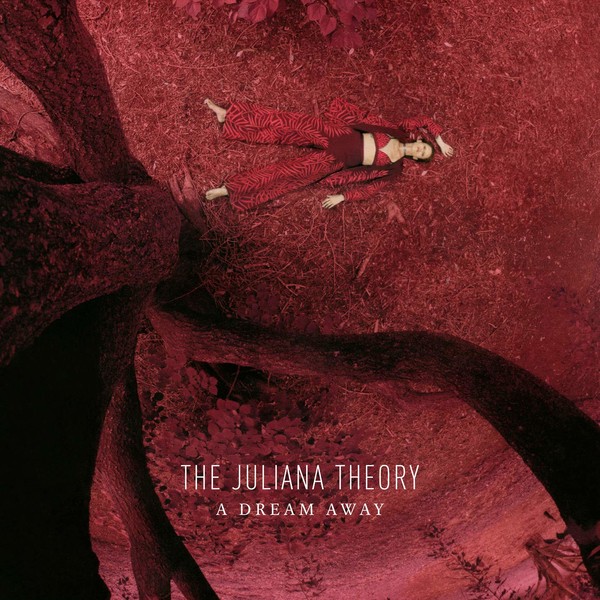Album Review: The Juliana Theory – ‘A Dream Away’
Posted: by The Editor
It’s always been tough to figure out how to categorize The Juliana Theory. Of course, the word that was always used for the Pennsylvania project was always emo, as it was for any vaguely melodic band in the late ‘90s and early 2000s. The band’s first effort, 1999’s Understand This Is a Dream, fit the bill well enough, sounding somewhat like the band Jimmy Eat World never was between Clarity and Bleed American. The following Emotion Is Dead, like that latter Jimmy album, runs the gamut of styles, from power balladry to sugary pop to crunchy post-hardcore to proggy electronic post-rock. When they signed to Epic the following year they blew up their sound for an all-out radio-ready heavy alternative rock style on Love; their final release, Deadbeat Sweetheartbeat, refined the sound they cultivated on Love. For each of their releases, really, The Juliana Theory felt like a different band – not one without an identity, necessarily, but one that was always shifting and contorting.
So when the band reunited as a duo in 2020 and released “Can’t Go Home,” it wasn’t necessarily a huge shock. They’ve never shied away from straight-up pop in the past; the band’s biggest song “We’re at the Top of the World” was about as pop in 2000 as “Can’t Go Home” is today. Unfortunately, the song didn’t feel much like The Juliana Theory at all. The beat-heavy, modulated-vocals pop sheen could’ve been anyone. The band’s following single, “Better Now,” drew from a similar well, but fortunately had a little more personality; its almost choral vocal effects call to mind songs like “Into the Dark” from their back catalog.
Thankfully, the band’s latest effort A Dream Away leaves off “Can’t Go Home” – a song that would feel rather out of place on a largely acoustic record – beginning instead with “Better Now” before leading, appropriately enough, into a redone take on “Into the Dark.” A Dream Away, the band has explained, was inspired by the acoustic tour they embarked on in 2019; this eight-track, half-hour-long LP reimagines past songs as stripped-down and pared back ballads. A song like “Into the Dark,” already a soft ballad, is prime material for such a reworking; vocalist Brett Detar is, if anything, a more powerful vocalist now than he was two decades ago, and the strings that fill out the latter half of the song ensure that, acoustic or not, this version of “Into the Dark” feels no less massive than its electric counterpart.
Another sensible inclusion is “We’re at the Top of the World,” which is fitted here with handclap percussion and strings; impressively, as with “Into the Dark,” the band is able to keep the energy and pop swagger of the original in this far less driving take. Perhaps the most successful update is “Bring It Low,” the opening cut from Love and the only post-Emotion Is Dead track to make it onto A Dream Away. Like the other two, “Bring It Low” succeeds in its ability to recreate the atmosphere of the original, with keys and echoed vocals to lend a haunting weight to this interpretation. Indeed, “Bring It Low” might be the one song on this album that actually surpasses the original. A song like “Is Patience Still Waiting?” by contrast ends up a completely different product; where the Emotion Is Dead recording of the song was a moody alt-rock earworm, this version puts more focus on spaciousness than it does on energy. The result is one of the most successful reimaginings on A Dream Away, giving this rendition “Is Patience Still Waiting?” a life of its own, allowing it to feel like a song of its own.
Less successful is the straightforward acoustic “If I Told You This Was Killing Me, Would You Stop?” which like “Is Patience Still Waiting?” sacrifices energy for atmosphere, but unlike that song ends up merely feeling like an acoustic take on the original, rather than a song in its own right. “Into the Dark” and “We’re at the Top of the World” each managed to reframe the songs in new contexts, retaining what made the original songs memorable, but “If I Told You This Was Killing Me” only feels like a retread of the Emotion Is Dead song without the scream-your-lungs-out passion.
The closing two songs both come from Understand This Is a Dream and, interestingly enough, are the two that most resemble the band’s new music. “Constellation,” the nearly-seven-minute showstopping finale on that album, is here fitted with modulated vocals and slowed to nearly a crawl; the climactic, guitar-heavy outro of the original is replaced with strings and the slow plucking of an acoustic guitar. Like with “If I Told You This Was Killing Me,” there’s a feeling that something’s missed; unlike that song, though, there’s also a clear attempt to make “Constellation” feel like something new. The finale here is “Duane Joseph,” which brings the album full circle with its heavily autotuned vocals and electronic beats. It is easily the furthest removed from the original, a scrappy, Something to Write Home About-indebted paean to nostalgia; unfortunately, like with “Can’t Go Home,” it ends up feeling like a rather generic pop song. As the song fades out Detar delivers the album’s final line, “There is no harm in hoping for change,” and it seems an appropriate end cap. The Juliana Theory is reinventing themselves again, it seems, and A Dream Away is an appropriate send-off to the band they used to be.
Disappointing / Average / Good / Great / Phenomenal
—
Zac Djamoos | @gr8whitebison
The Popdosemagazine is ad-free and 100% supported by our readers. If you’d like to help us produce more content and promote more great new music, please consider donating to our Patreon page, which also allows you to receive sweet perks like free albums and The Popdosemagazine merch.



